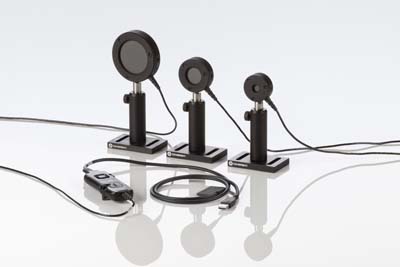EnergyMax Sensor
EnergyMax Sensor
Coherent Inc. has expanded their meterless laser measurement concept with a new range of energy sensors in which all meter electronics are miniaturized and integrated within the sensor head cable.

Coherent Inc. has expanded their meterless laser measurement concept with a new range of energy sensors in which all meter electronics are miniaturized and integrated within the sensor head cable. Specifically, Coherent's entire range of high performance EnergyMax sensors is now available in this form factor with either RS-232 or USB 2.0 connectivity.
This product range enables measurement of the energy per pulse or average power of pulsed lasers from the nanojoule to the multi-joule level, over wavelengths from the deep ultraviolet through the far infrared, and from single pulses to repetition rates of 10 kHz (with measurement of every pulse). Furthermore, multiple EnergyMax sensors can share a trigger (internal or external) for synchronized operation, such as to enable pulse ratiometry.
Coherent's EnergyMax PC applications software provides a virtual instrument interface for these sensors, enabling the user to take laser energy readings, log data and compute measurement statistics. Alternatively, LabView drivers and ASCII host interface commands permit those who wish to write their own software to acquire and directly manipulate data, and to control all aspects of meter operation. These new EnergyMax USB/RS meterless sensors will be particularly attractive to system builders because their small size allows them to be easily embedded within instrumentation, and their RS-232 or USB communications capabilities facilitate automated operation by a host computer.
Furthermore, EnergyMax USB/RS sensors significantly reduce the user's overall cost of ownership by eliminating the need to purchase a separate, more costly meter with each sensor, and by reducing annual calibration costs associated with integrating the electronics into the sensor. These products are also useful in a lab and research setting because they can be used as standalone instruments with a computer, or integrated smoothly into any experiment with an automated control and data acquisition system.





